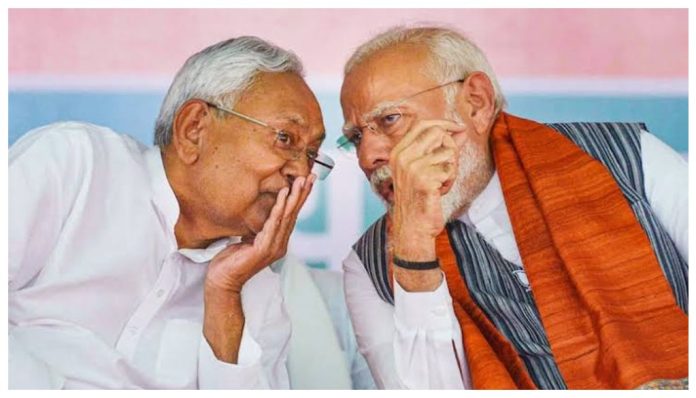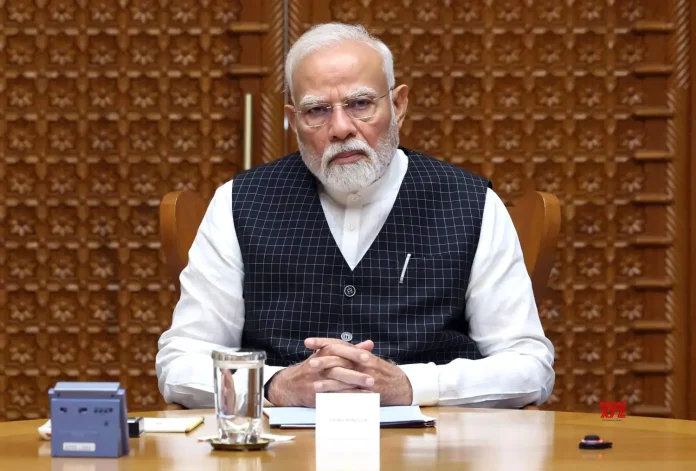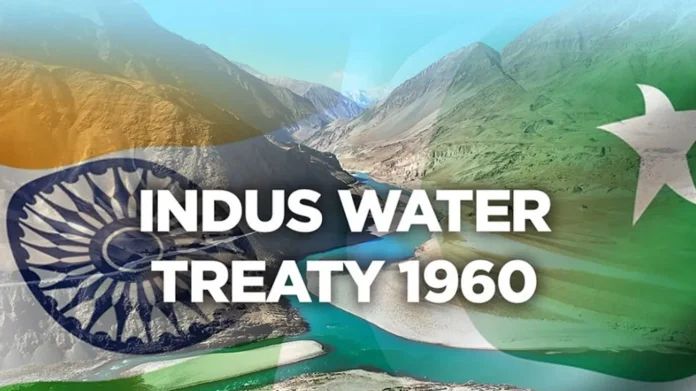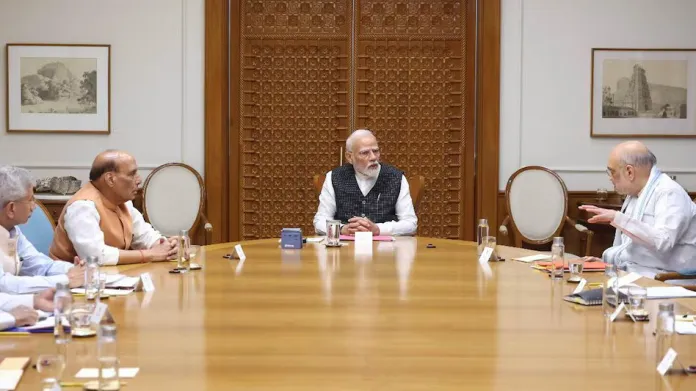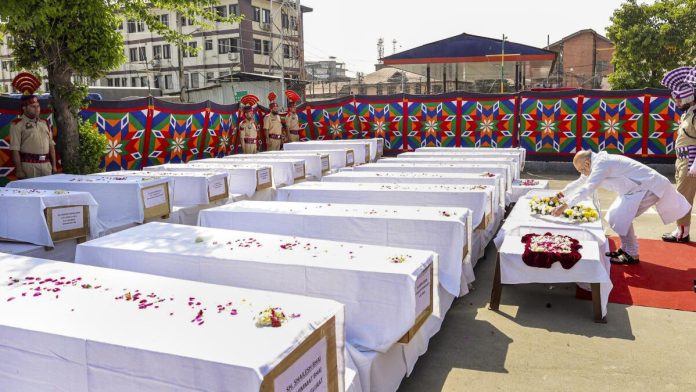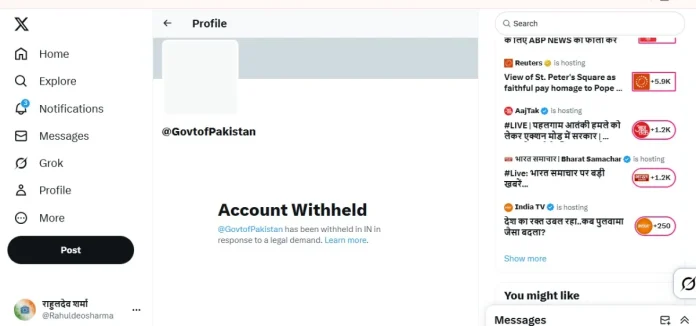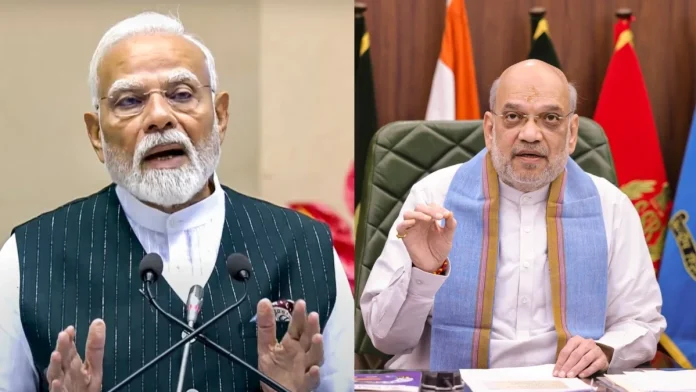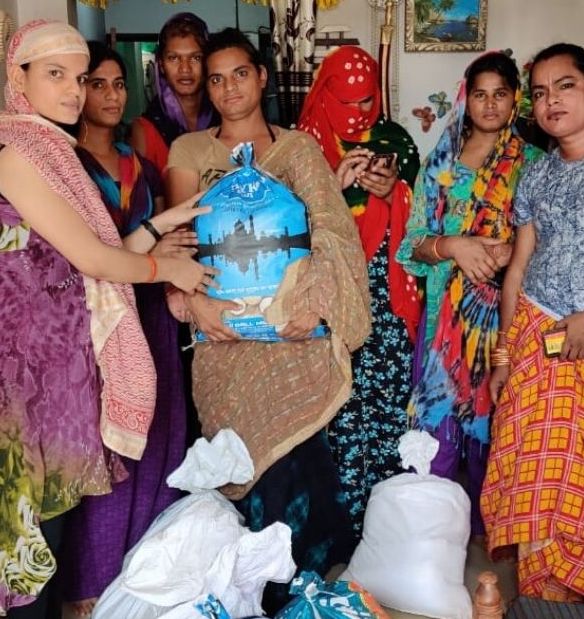Kashmir Terror Attack: Mortal Remains of Two Kolkata Tourists Return Home Amid Grief and Outrage
Kolkata, India: The mortal remains of two tourists from Kolkata, who fell victim to a terror attack in Pahalgam, Kashmir, were brought back to the city on Wednesday evening. Amid tearful scenes and seething anger, the families of Sameer Guha of Behala and Bitan Adhikari of Patuli received their loved ones at Netaji Subhas Chandra Bose International Airport around 8 pm.
Political Leaders Unite in Grief
Senior state ministers Aroop Biswas and Firhad Hakim, Leader of the Opposition Suvendu Adhikari, and BJP MP from Tamluk Agnimitra Paul were present at the airport to offer condolences and support to the bereaved families.
“This is unbearable. They killed my husband in front of our child. I’m here only because you all came. I want justice,” said a grief-stricken Sohini Adhikari, widow of Bitan Adhikari. Holding her young son, she added, “He supported you all wholeheartedly.”
Suvendu Adhikari consoled the child and assured Sohini, “This will not be tolerated. Bitan was targeted because he was a Hindu. We will not rest until justice is served.”
Terror Claims 26 Lives, Bengal Mourns
The attack in Pahalgam claimed 26 lives, including Manish Ranjan Mishra from Jhalda in Purulia. The West Bengal government has extended all possible support for the last rites and is coordinating efforts to bring back other stranded tourists.
Chief Minister Mamata Banerjee condemned the attack, calling it a “heinous act of terror” and urged for swift and strong action against the perpetrators. “Terrorism has no religion. We want answers and action,” she said during a cabinet meeting.
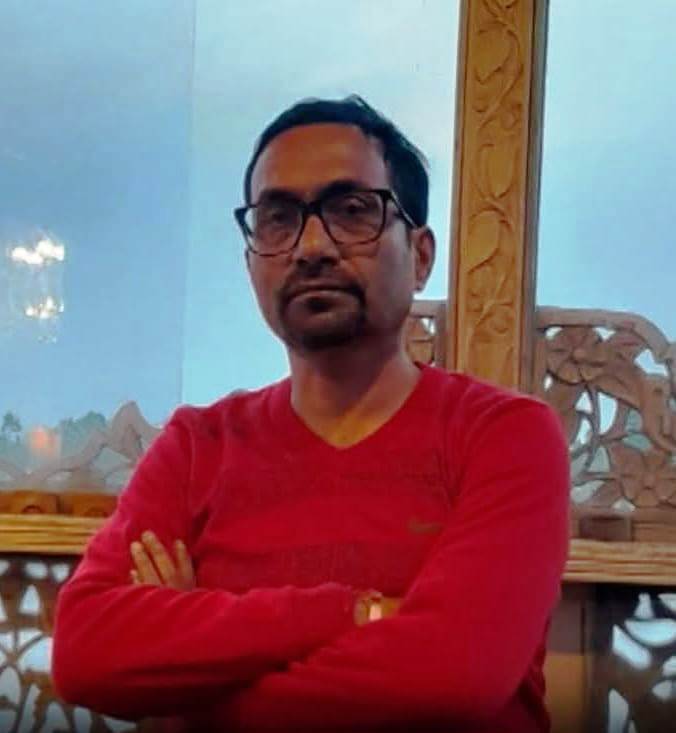
Samir Guha: A Family Man Whose Life Was Cut Short
Samir Guha, a dedicated central government employee, was visiting Kashmir with his wife and daughter for a much-anticipated holiday. A resident of Sakher Bazar in Behala, Guha was known for his kind-hearted nature and love for travel.
His wife recounted the chilling moments of the attack. “They asked for identity first… and then shot him,” she told relatives gathered outside their home. The family had been planning the trip for months. Friends recall Guha as a disciplined man who balanced work and family with grace. A frequent participant in local cultural events, he was also an active volunteer during community drives.
Guha had recently celebrated his daughter’s academic achievements and was planning a surprise for his wife’s birthday next month. The community is now left in shock, struggling to process the senseless killing.

Bitan Adhikari: A Beloved Father and Devoted Husband
Bitan Adhikari, a resident of Vaishnav Ghata in Patuli, was travelling with his wife Sohini and their young son when terrorists opened fire. A soft-spoken man known for his generosity, Bitan worked in a private firm and often spoke of Kashmir as a dream destination.
“He was our strength,” said his elder sister. “He cared for our elderly parents and was planning to build a new house.” Sohini recalled how Bitan was shielding their son when the attack occurred. “He died protecting us,” she said through tears.
Their son, too young to understand the gravity of the tragedy, clung to his mother at the airport while leaders tried to console him. Neighbours remember Bitan as someone who never missed a festival or a community event.

Manish Ranjan Mishra: From Jhalda to the Intelligence Bureau
Manish Ranjan Mishra, 42, had an inspiring journey — from a small town in Purulia to the Intelligence Bureau of India. Known as a brilliant student, cricketer, and quizzer, Manish left stable jobs in banking and Customs to fulfil his dream of serving the nation.
“He believed in purpose over comfort,” said Manoj Rungta, his childhood friend. After stints in Ranchi and Chennai, Manish joined the IB in 2012 through the Staff Selection Commission.
During his service, he was posted in Ranchi, Delhi, and Hyderabad. He loved to travel and had taken leave to holiday in Kashmir with his wife Joya and their two children. Tragically, the trip turned fatal.
His parents received the devastating news while en route to join him in Jammu. “He was a gem,” said Aditya Sharma, a neighbour. “We’ve lost not just a friend but a symbol of pride for Jhalda.”
Chief Minister’s Statement and Ongoing Efforts
Chief Minister Mamata Banerjee announced that the West Bengal government had made all arrangements for the return and funerals of the victims. She added that while 26 people remained stranded due to a landslide, they were safe and being monitored by the administration.
“We are in touch and taking every step to ensure their safe return,” the Chief Minister assured.
India Suspends Indus Treaty, Cuts Diplomatic Ties with Pakistan After Pahalgam Terror Attack
In a decisive response to the deadly terrorist attack in Pahalgam the Cabinet Committee on Security (CCS) conducted a meeting under the Chairmanship of the Prime Minister. The CCS was briefed in detail on the terrorist attack on 22 April 2025 in Pahalgam, in which 25 Indians and one Nepali citizen were killed. A number of others sustained injuries. The CCS condemned the attack in the strongest terms and expressed its deepest condolences to the families of the victims and hoped for the early recovery of the injured.
The Ministry of External Affairs further stated that, strong expressions of support and solidarity have been received from many Governments around the world, which have unequivocally condemned this terror attack.
The CCS recorded its appreciation for such sentiments, which reflect zero tolerance for terrorism.The CCS acknowledged the global solidarity shown towards India in the wake of this tragedy, reinforcing the global consensus against terrorism.
Key measures announced by the CCS
-
Indus Waters Treaty Suspended
-
Attari Border Check Post Shut Down
-
SAARC Visa Exemption for Pakistan Cancelled
-
Military Advisors Expelled, Reciprocal Withdrawal
-
High Commission Staff Reduced
Suspension of the Indus Waters Treaty
India has decided to hold the Indus Waters Treaty of 1960 in abeyance with immediate effect. This crucial agreement governs the sharing of water from the Indus River system between the two nations.
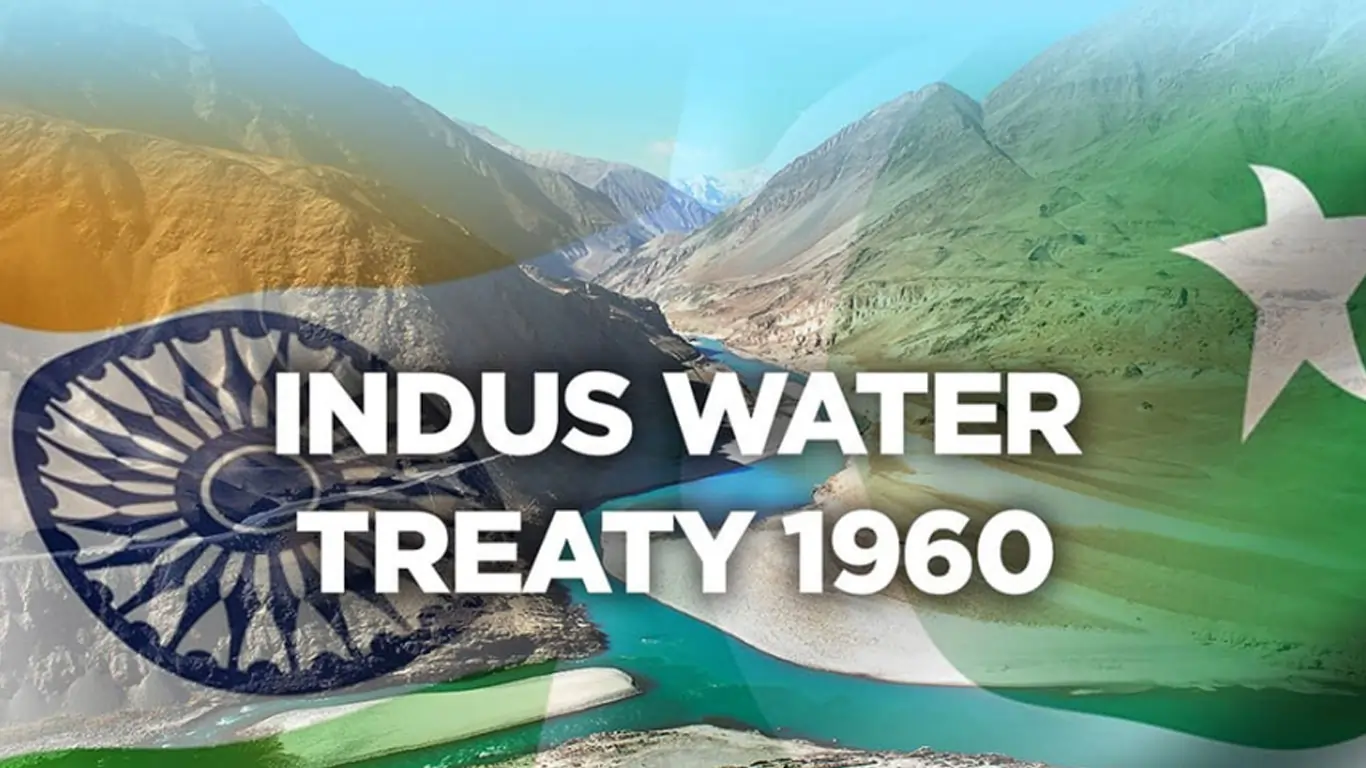
The CCS stated that the treaty will remain suspended until Pakistan credibly and irrevocably ceases its support for cross-border terrorism. This decision marks a major shift in bilateral relations, as the Indus Waters Treaty has been a relatively stable element despite periods of tension between the two nations.
What is The Indus Water Treaty?
The Indus Water Treaty (IWT) is a water-distribution treaty between India and Pakistan, arranged and negotiated by the World Bank. This was to use the water available in the Indus River and its tributaries.
It was signed in Karachi on 19 September 1960 by then Indian Prime Minister Jawaharlal Nehru and then Pakistani President and Field Marshal Ayub Khan. On 23 April 2025, the Foreign Secretary of India announced the suspension of the Indus Waters Treaty with Pakistan following the 2025 Baisaran Valley Terrorist Attack.
Closure of Attari-Wagah Border Check Post
India has further ordered the immediate closure of the Integrated Check Post at Attari, a vital land route for cross-border movement of people and goods between India and Pakistan. Individuals who have already crossed over with valid endorsements will be permitted to return through this route before May 1, 2025. The closure of this key transit point aims to restrict any further cross-border activities and goods exports, sending a strong signal regarding India’s resolve.
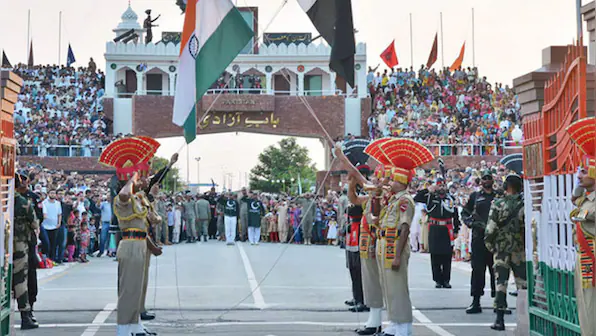
The Attari Check post
Attari, also spelled Atari, is a village of Amritsar district in the Punjab state of India, 3 km from the Indo-Pakistani border at Wagah. It is situated 25 km west of the Sikh holy city of Amritsar, and is the last Indian station on the rail route connecting Lahore, Pakistan with the Indian capital Delhi. Exports to Pakistan, such as soybean, chicken feed, vegetables, red chillies, plastic dana, and plastic yarn, travel through this route.
Cancellation of SAARC Visa Exemption Scheme for Pakistani Nationals
India has suspended the SAARC Visa Exemption Scheme (SVES) for Pakistani nationals. All SVES visas previously issued to Pakistani citizens have been cancelled with immediate effect. Furthermore, any Pakistani national currently in India under the SVES has been given a strict 48-hour ultimatum to leave the country. This measure significantly restricts the movement of Pakistani citizens to India under this previously facilitated scheme.
What is the SAARC Visa Exemption?
The Leaders of South Asia, in the fourth SAARC Summit held on 29-31 December, 1988 at Islamabad recognized the vitality of people to people contact among the peoples of South Asian countries. The leaders in the 4th Summit decided to issue a special travel document to certain categories of dignitaries and exempt them from visas and other travelling documents.
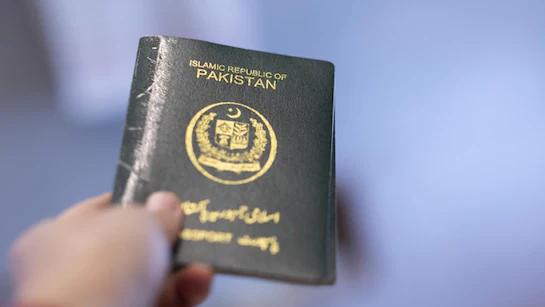
This special travel document is known as SAARC Visa Exemption Sticker and is issued to 24 categories of entitled persons which include Dignitaries, Judges of higher courts, Parliamentarians, Senior Officials, Businessmen, Journalists, Sportsmen etc. The SAARC Visa Exemption Scheme, active since 1992, enables visa-free travel for selected groups.
Expulsion of Pakistani Military Advisors and Reciprocal Withdrawal
Foreign Secretary Vikram Misri said, “The Defence/Military, Naval and Air Advisors in the Pakistan High Commission in New Delhi are declared Persona Non Grata. They have a week to leave India. India will be withdrawing its own Defence/Navy/Air Advisors from the Indian High Commission in Islamabad. These posts in the respective High Commissions are deemed annulled. Five support staff of the Service Advisors will also be withdrawn from both High Commissions.”
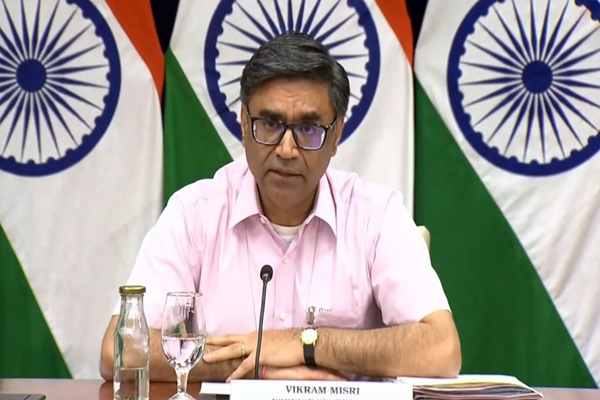
These key liaison posts in both High Commissions are now annulled, and five support staff members from each side associated with these advisors will also be withdrawn. This action severely curtails the military and defense-related diplomatic engagement between the two countries.
What does the term ‘persona non grata’ mean?
In diplomacy, a persona non grata (PNG) (Latin: “person not welcome”) is a foreign diplomat who is asked by the host country to be recalled to their home country. If the person is not recalled as requested, the host state may refuse to recognize the person concerned as a member of the diplomatic mission (including the removal of diplomatic immunity). A host country may declare any member of a diplomatic staff persona non grata at any time without any explanation like India has done.
Reduction of Diplomatic Personnel
India has decided to further reduce the overall strength of its High Commission in Islamabad to 30, down from the current 55. This reduction is to be in effect by May 1, 2025, and signifies a further downgrading of diplomatic ties between the two nations. This measure will limit the scope and scale of bilateral interactions and diplomatic activities.
Extradition of Tahawwur Rana
The CCS reviewed the overall security situation and directed all forces to maintain high vigil. It resolved that the perpetrators of the attack will be brought to justice and their sponsors held to account. As with the recent extradition of Tahawwur Rana, India will be unrelenting in the pursuit of those who have committed acts of terror, or conspired to make them possible.
The CCS, which includes key ministers such as Home Minister Amit Shah, Defence Minister Rajnath Singh, and External Affairs Minister S Jaishankar, along with National Security Advisor Ajit Doval, also reviewed the overall security situation and directed all security forces to maintain high vigilance.
पहलगाम हमले के बाद भारत ने तोड़ी Indus Water Treaty-जानिए क्या है सिंधु जल संधि
Pahalgam Attack: जम्मू-कश्मीर के पहलगाम में हुए चरमपंथी हमले के बाद भारत ने पाकिस्तान के साथ Indus Water Treaty को रोक दिया है, यानी अब इस संधि के मुताबिक भारत पाकिस्तान के साथ कोई जानकारी साझा नहीं करेगा और न ही इससे जुड़ी किसी बैठक में हिस्सा लेगा। नई दिल्ली में प्रधानमंत्री नरेंद्र मोदी की अध्यक्षता में सुरक्षा मामलों की कैबिनेट कमेटी (CCS) की बैठक में ये फैसला लिया गया। जम्मू-कश्मीर के पहलगाम में मंगलवार को चरमपंथी हमला हुआ था। इस हमले में 27 लोगों की मौत हुई है और कई लोग घायल हुए हैं। Pahalgam Attack की इस घटना ने पूरे देश को झकझोर कर रख दिया है।
भारत के पलटवार से घबराया पाकिस्तान
Indus Water Treaty: पाकिस्तान ने भारत सरकार के इस फ़ैसले पर एतराज जताया है। पाकिस्तान तहरीक ए इंसाफ़ (PTI) के नेता और पाकिस्तान के पूर्व सूचना और तकनीकी मंत्री चौधरी फवाद हुसैन ने कहा कि अंतरराष्ट्रीय क़ानून के तहत भारत ऐसा नहीं कर सकता है। उन्होंने सोशल मीडिया प्लेटफॉर्म X पर पोस्ट कर कहा, “अंतरराष्ट्रीय क़ानूनों के तहत भारत इंडियन बेसिन संधि (Indus Water Treaty) पर रोक नहीं लगा सकता। ऐसा करना समझौते से जुड़े क़ानून का घोर उल्लंघन होगा।” पाकिस्तान के उप प्रधानमंत्री और विदेश मंत्री इशाक डार ने X पर पोस्ट किया, “भारत सरकार की ओर से आज शाम जारी किए गए बयान का जवाब देने के लिए गुरुवार सुबह प्रधानमंत्री शहबाज़ शरीफ़ ने नेशनल सिक्योरिटी कमेटी की मीटिंग बुलाई है।”
इस बीच भारत में बुधवार को प्रधानमंत्री आवास पर हुई बैठक में केंद्रीय गृह मंत्री अमित शाह, विदेश मंत्री एस जयशंकर, रक्षा मंत्री राजनाथ सिंह और राष्ट्रीय सुरक्षा सलाहकार अजित डोभाल सहित कई शीर्ष अधिकारी मौजूद थे। कैबिनेट की बैठक के बाद विदेश सचिव विक्रम मिसरी ने बयान जारी किया। इस बयान में उन्होंने कहा कि भारत ने पाकिस्तान के साथ 1960 की सिंधु जल संधि को तुरंत प्रभाव से स्थगित करने का फ़ैसला किया है। उन्होंने कहा कि ये फ़ैसला तब तक लागू रहेगा, जब तक पाकिस्तान विश्वसनीय ढंग से सीमा पार आतंकवाद को समर्थन देना बंद नहीं कर देता।
In a press conference held by Foreign Secretary Vikram Misri, India, in response to the Pahalgam attack, has taken several measures against Pakistan for promoting cross-border terrorism. pic.twitter.com/qYlMzAv7Eh
— ADV Pramod Kumar (@thelawyr) April 24, 2025
क्या है Indus Water Treaty
Pahalgam Attack: ब्रिटिश राज के दौरान ही दक्षिण पंजाब में सिंधु नदी घाटी पर बड़ी नहर का निर्माण करवाया गया था। उस इलाक़े को इसका इतना लाभ मिला कि बाद में वो दक्षिण एशिया का एक प्रमुख कृषि क्षेत्र बन गया। भारत और पाकिस्तान के बीच बंटवारे के दौरान जब पंजाब को विभाजित किया गया तो इसका पूर्वी भाग भारत के पास और पश्चिमी भाग पाकिस्तान के पास गया। बंटवारे के दौरान ही सिंधु नदी घाटी और इसकी विशाल नहरों को भी विभाजित किया गया। लेकिन इससे होकर मिलने वाले पानी के लिए पाकिस्तान पूरी तरह भारत पर निर्भर था। पानी के बहाव को बनाए रखने के उद्देश्य से पूर्व और पश्चिम पंजाब के चीफ़ इंजीनियरों के बीच 20 दिसंबर 1947 को एक समझौता हुआ। इसके तहत बंटवारे से पहले तय किया गया पानी का निश्चित हिस्सा भारत को 31 मार्च 1948 तक पाकिस्तान को देते रहना तय हुआ। 1 अप्रैल 1948 को जब समझौता लागू नहीं रहा, तो भारत ने दो प्रमुख नहरों का पानी रोक दिया जिससे पाकिस्तानी पंजाब की 17 लाख एकड़ ज़मीन पर हालात ख़राब हो गए। भारत के इस क़दम के कई कारण बताए गए, जिसमें एक था कि भारत कश्मीर मुद्दे पर पाकिस्तान पर दबाव बनाना चाहता था।
बाद में हुए समझौते के बाद भारत पानी की आपूर्ति जारी रखने पर राज़ी हो गया। 1951 में प्रधानमंत्री जवाहरलाल नेहरू ने टेनसी वैली अथॉरिटी के पूर्व प्रमुख डेविड लिलियंथल Devid Lilienthal को भारत बुलाया। Lilienthal पाकिस्तान भी गए और वापस अमेरिका लौटकर उन्होंने सिंधु नदी घाटी जल बंटवारे पर एक लेख लिखा। ये लेख विश्व बैंक प्रमुख और Lilienthal के दोस्त डेविड ब्लैक ने भी पढ़ा और उन्होंने भारत और पाकिस्तान के प्रमुखों से इस बारे में संपर्क किया, और फिर दोनों पक्षों के बीच बैठकों का सिलसिला शुरू हुआ। ये बैठकें क़रीब एक दशक तक चलीं और आख़िरकार 19 सितंबर 1960 को कराची में सिंधु नदी घाटी संधि पर भारत के प्रधानमंत्री जवाहरलाल नेहरु और पाकिस्तान के राष्ट्रपति अयूब खान ने हस्ताक्षर किए।
क्या हैं Indus Water Treaty के प्रावधान
Indus Water Treaty: नदियों के सिंधु प्रणाली का पानी मुख्य रूप से तिब्बत, अफगानिस्तान, जम्मू-कश्मीर और हिमाचल प्रदेश के हिमालय के पहाड़ों में शुरू होता है। सिंधु का पानी गुजरात के कराची और कोरी क्रीक के अरब सागर में समाहित होने से पहले पंजाब, बालोचितान, काबुल, कंधार, कुनार, हिमाचल प्रदेश, हरियाणा, राजस्थान, गुजरात, जम्मू-कश्मीर, सिंध आदि राज्यों से होकर बहता है। जहां कभी इन नदियों के द्वारा सिंचित होने वाली भूमि की केवल एक संकीर्ण पट्टी थी, पिछली सदी के घटनाक्रमों ने नहरों और भंडारण सुविधाओं का एक बड़ा नेटवर्क तैयार किया है जो 2009 तक अकेले पाकिस्तान में 4.7 लाख एकड़ (190,000 किमी) से अधिक पानी प्रदान करता है जो किसी एक नदी प्रणाली द्वारा सिंचित होने वाला सबसे बड़ा क्षेत्र है। Indus Water Treaty के मुताबिक, सिंधु, झेलम और चिनाब को पश्चिमी नदियां बताते हुए इनका पानी पाकिस्तान के लिए तय किया गया। जबकि रावी, ब्यास और सतलुज को पूर्वी नदियां बताते हुए इनका पानी भारत के हिस्से आया। अधिक विवादास्पद वे प्रावधान थे, जिनके अनुसार जल का वितरण किस प्रकार किया जाएगा, यह निश्चित होना था। क्योंकि पाकिस्तान के नियंत्रण वाली नदियों का प्रवाह पहले भारत से होकर आता है, संधि के अनुसार भारत को उनका उपयोग सिंचाई, परिवहन और बिजली उत्पादन हेतु करने की अनुमति है। इस दौरान इन नदियों पर भारत द्वारा परियोजनाओं के निर्माण के लिए सटीक नियम निश्चित किए गए। यह संधि पाकिस्तान के डर का परिणाम थी, कि नदियों का आधार (Basin) भारत में होने के कारण कहीं युद्ध आदि की स्थिति में उसे सूखे और अकाल आदि का सामना न करना पड़े।
इस संधि में दोनों देशों के बीच समझौते को लेकर बातचीत करने और साइट के मुआयना आदि का प्रावधान भी था। इसी संधि में सिंधु आयोग भी स्थापित किया गया। इस आयोग के तहत दोनों देशों के कमिश्नरों के मिलने का प्रस्ताव था। संधि में दोनों कमिश्नरों के बीच किसी भी विवादित मुद्दे पर बातचीत का प्रावधान है। इसमें यह नियम भी था कि जब कोई एक देश किसी परियोजना पर काम करता है और दूसरे को उस पर कोई आपत्ति है तो पहला देश उसका जवाब देगा। इसके लिए दोनों पक्षों की बैठकें होंगी। बैठकों में भी अगर कोई हल नहीं निकल पाया तो दोनों देशों की सरकारों को इसे मिलकर सुलझाना होगा। साथ ही ऐसे किसी भी विवादित मुद्दे पर तटस्थ विशेषज्ञ की मदद लेने या Court Of Arbitration में जाने का प्रावधान भी रखा गया है।
संधि के बावज़ूद दोनों देशों में पानी को लेकर तनाव
Indus WaterTreaty: 1960 में हुए सिंधु जल समझौते के बाद से भारत और पाकिस्तान में कश्मीर मुद्दे को लेकर तनाव बना हुआ है। हर प्रकार के असहमति और विवादों का निपटारा संधि के ढांचे के भीतर प्रदत्त कानूनी प्रक्रियाओं के माध्यम से किया गया है। इस संधि के प्रावधानों के अनुसार सिंधु नदी के केवल 20 प्रतिशत पानी का उपयोग भारत द्वारा किया जा सकता है। जिस समय यह संधि हुई थी, उस समय पाकिस्तान के साथ भारत का कोई भी युद्ध नही हुआ था और दोनों देशों के बीच परिस्थिति बिल्कुल सामान्य थी। पर 1965 से पाकिस्तान लगातार भारत के साथ हिंसा के विकल्प तलाशने लगा, जिसके परिणामस्वरूप 1965 में दोनों देशों में युद्ध भी हुआ और पाकिस्तान को इस लड़ाई में हार का सामना करना पड़ा। फिर 1971 में पाकिस्तान ने भारत के साथ फिर युद्ध छेड़ा, जिस में उस को अपना एक हिस्सा खोना पड़ा जो अब Bangla Desh के नाम से जाना जाता है। तब से अब तक पाकिस्तान आतंकवाद और सेना दोनों का इस्तेमाल कर रहा है भारत के विरुद्ध, जिस की वजह से किसी भी समय Indus Water Treaty खत्म होने का अंदेशा पहले से ही था। जिस प्रकार ये नदियां भारत का हिस्सा हैं, तो स्वभाविक रूप से भारत इस समझौते को तोड़ कर पूरे पानी का इस्तेमाल सिंचाई विद्युत बनाने में जल संचय करने में कर सकता है। वर्तमान परिस्थिति इतनी तनावपूर्ण है कि यह समझौता रद्द कर दिया गया है, क्योंकि जो परिस्थिति 1960 में थी, वो अब नही रही है। जम्मू-कश्मीर में 2007 में शुरू हुई किशनगंगा हाइड्रोइलेक्ट्रिक परियोजना के तहत Run Of The River बांध का निर्माण किया गया है। पाकिस्तान इस आधार पर इस परियोजना का विरोध कर रहा है कि सिंधु जल समझौते के तहत भारत को नदी का पानी डायवर्ट करने की अनुमति नहीं है। दरअसल, यह बांध किशनगंगा नदी का पानी, झेलम नदी पर वने पॉवर प्लांट की ओर डायवर्ट करता है। इसका इस्तेमाल सिंचाई के साथ ही बिजली उत्पादन के लिए किया जाता है। यह प्लांट करीब 330 मेगावाट बिजली पैदा करता है।
Indus Water Treaty इतनी महत्वपूर्ण क्यों है
Indus Water Treaty: छह दशकों से अधिक समय से सिंधु जल संधि (IWT) भारत और पाकिस्तान के बीच शांतिपूर्ण जल बंटवारे को सुविधाजनक बनाने में महत्वपूर्ण रही है, यहां तक कि बढ़े हुए राजनीतिक और सैन्य तनाव के समय में भी। Indus Water Treaty एशिया में दो देशों के बीच एकमात्र सीमा पार जल-बंटवारे का समझौता है, जो क्षेत्रीय सहयोग का एक महत्वपूर्ण उदाहरण है। अनोखी बात यह है कि, यह संधि डाउनस्ट्रीम देश पाकिस्तान के पक्ष में है, जिससे उसे सिंधु नदी प्रणाली के लगभग 80 प्रतिशत पानी तक पहुंच मिलती है। यह आवंटन उल्लेखनीय रूप से सर्वोच्च है-अमेरिका के साथ 1944 की जल संधि के तहत मैक्सिको को मिलने वाले हिस्से से लगभग 90 गुना अधिक! भारत और पाकिस्तान के बीच पानी को लेकर विवादों को सुलझाने के लिए जिम्मेदार निकाय, स्थायी सिंधु आयोग ने 1965 और 1971 के युद्धों के दौरान भी अपना कार्य जारी रखा, जिससे संधि के ढांचे के लचीलेपन का आकलन हुआ। Indus Water Treaty को लेकर भारत की प्रतिबद्धता इसी बात से ज़ाहिर होती है कि 2001 में भारतीय संसद पर हुए हमले और 2019 में पुलवामा हमले सहित कई आतंकी हमलों का सामना करने के बावजूद भारत ने संधि से खुद को नहीं हटाया है। इसने Vienna Convention on Diplomatic Relations (1961) का भी हवाला नहीं दिया है, जो अंतरराष्ट्रीय समझौतों के प्रति उसकी प्रतिबद्धता को दर्शाता है। इस संधि को अक्सर विश्व स्तर पर प्रतिद्वंद्वी देशों के बीच जल सहयोग के लिए एक सफल मॉडल के रूप में उद्धृत किया जाता है, जो दर्शाता है कि कैसे संवाद और कानूनी ढांचे प्रभावी रूप से साझा प्राकृतिक संसाधनों का प्रबंधन कर सकते हैं।
क्या पानी को तरस जाएगा पाकिस्तान
Indus Water Treaty: विश्व बैंक की लंबी मध्यस्थता के बाद भारत और पाकिस्तान के बीच सिंधु जल समझौता हुआ था। इस समझौते के लागू होने से पहले 1अप्रैल 1948 को भारत ने दो प्रमुख नहरों का पानी रोक दिया था, जिससे पाकिस्तानी पंजाब की 17 लाख एकड़ जमीन पानी को तरस गई थी। अब इस समझौते को पूरी तरह से रद्द करने के बाद भारत ने पाकिस्तान की कमर तोड़कर रख दी है। दरअसल, पाकिस्तान का पंजाब और सिंध प्रांत पानी की जरूरतों को पूरा करने के लिए पूरी तरह से चिनाब, झेलम और सिंधु जैसी नदियों के पानी पर निर्भर था, लेकिन अब पाकिस्तान को इन नदियों का पानी नहीं मिलेगा। यह पहला मौका है जब भारत ने सिंधु जल समझौते पर रोक लगाया है। मोदी सरकार ने पाकिस्तान के साथ Indus Water Treaty को स्थगित करने का जो फैसला किया है वह पाकिस्तान की आर्थिक कमर तोड़ सकता है। दरअसल समझौता स्थगित होने का यह अर्थ नहीं है कि पाकिस्तान को तत्काल सिंधु नदी का पानी नहीं मिलेगा, बल्कि इसके तहत भारत पर से अब यह बाध्यता खत्म हो जाएगी कि वह पाकिस्तान को सिंधु के पानी की आपूर्ति सुनिश्चित करे। भारत भविष्य में सिंधु नदी पर बांध बनाकर पानी रोकने के लिए स्वतंत्र होगा। ऐसा हुआ तो पाकिस्तान के लिए सही मायनों में संकट पैदा होगा। पाकिस्तान की करीब 80 प्रतिशत कृषि सिंचाई, सिंधु जल प्रणाली पर निर्भर है। सिंधु जल समझौते पर भारत के रोक लगाने से पाकिस्तान में जल संकट उत्पन्न होगा और इसका असर कृषि पर पड़ेगा। वहीं, सिंधु नदी से जुड़े कई Hydropower Projects पाकिस्तान में हैं। ऐसे में जल की कमी से इनका उत्पादन प्रभावित होगा और ऊर्जा संकट गहराएगा, जो पाकिस्तान में पहले से ही एक बड़ी समस्या है। वहीं, पाकिस्तान के पंजाब और सिंध क्षेत्रों में लाखों लोग इस नदी प्रणाली पर पीने के पानी के लिए निर्भर हैं, जो भारत के इस फैसले से प्रभावित होंगे। आम जनता प्रभावित होगी, तो इसका दबाव सरकार पर बनेगा।
Indus Water Treaty Suspended: What It Means for India, Pakistan, and the Flow of Vital Rivers
India has suspended the Indus Waters Treaty with Pakistan on Wednesday, April 23 2025, a day after 28 people were killed in a terrorist attack in Jammu and Kashmir’s Pahalgam.
The move is among the five big punitive moves taken by New Delhi against Islamabad in the wake of the terror attacks.
What is Indus Water Treaty?
The Indus system comprises the main river, Indus, and five left bank tributaries, i.e Ravi, Beas, Sutlej, Jhelum, and Chenab.
The Indus Waters Treaty is a water-sharing agreement signed in 1960 between India and Pakistan, with help from the World Bank. The main aim was to settle how both countries would use the rivers that flow from the Himalayas into their territories. After the partition in 1947, both countries relied heavily on these rivers for farming and drinking water, which made the issue quite sensitive.
Under the treaty, six rivers were divided between the two nations. India got full control over the three eastern rivers—Ravi, Beas, and Sutlej. Pakistan, on the other hand, received the rights to use the three western rivers—Indus, Jhelum, and Chenab. India can still use the western rivers for certain purposes, like generating hydroelectric power, but it can’t reduce the flow of water to Pakistan.
To keep things running smoothly, a Permanent Indus Commission was set up. This commission has officials from both countries who meet regularly to share data and sort out any disagreements.
What could be the impact of this move?
Pradeep Kumar Saxena, who served as India’s Indus Water Commissioner for over six years, told PTI,” India, as an upper riparian country, has multiple options. This could be the first step towards the abrogation of the Treaty, if the Government so decides.”
“Although there is no explicit provision in the Treaty for its abrogation, Article 62 of the Vienna Convention on Law of the Treaties provides sufficient room under which the treaty can be repudiated in view of the fundamental change of circumstances which has occurred with regard to those existing at the time of conclusion of the Treaty,” he added.
Last year, India in a formal notice to Pakistan, sought the “review and modification” of the treaty.
According to Saxena, India is under “no obligation” to follow the restrictions on the “reservoir flushing” of the Kishanganga reservoir and other projects on Western rivers in Jammu and Kashmir.
“The Indus Water Treaty currently prohibits it. Flushing can help India desilt its reservoir but then filling the entire reservoir could take days. Under the treaty, reservoir filling after the flushing has to be done in August — peak monsoon period — but with the pact in abeyance, it could be done anytime,” he told PTI.
However, carrying out the exercise when sowing season begins in Pakistan could be “detrimental”, especially when a large part of Punjab in Pakistan depends on the Indus and its tributaries for irrigation.
According to the treaty, design restrictions exist on building structures like dams on the Indus and its tributaries. Earlier, Pakistan has raised objections over the designs, but in the future, it will not be obligatory to take the concerns on board .
In the past, almost every project has been objected to by Pakistan, the notable ones are Salal, Baglihar, Uri, Chutak, Nimoo Bazgo, Kishenganga, Pakal Dul, Miyar, Lower Kalnai and Ratle.
After the Pulwama terror attack in 2019, the government cleared eight more hydropower projects in Ladakh. The objections may no longer apply to the new projects. There are also operational restrictions on how reservoirs are to be filled and operated.
With the treaty in abeyance, these are no longer applicable. Saxena told PTI that India can stop sharing flood data on the rivers.
“This could also prove detrimental to Pakistan, especially during the monsoon when rivers swell. India will now have no restriction on storage on Western rivers, particularly the Jhelum, and India can take several flood control measures to mitigate floods in the Valley,” Saxena added.
Looking forward
Despite India’s suspension of the Indus Waters Treaty, water will not stop flowing into Pakistan overnight. The main reason is practical: India currently lacks the infrastructure to block or divert the natural flow of the Indus, Jhelum, and Chenab rivers, which supply most of Pakistan’s water.
Building the large dams and reservoirs needed to hold back or redirect these rivers would take years, if not longer, and require major investment and planning. For now, the rivers will continue to flow into Pakistan as they always have, though India may stop sharing water flow data or halt the regulated releases from its hydro projects
What changes immediately is the sense of predictability and security that the treaty provided for over sixty years. Pakistan’s farmers, cities, and power stations have relied on a steady, reliable flow of water from these rivers. With the treaty suspended, India is no longer bound by earlier restrictions on dam construction or water usage, and could, over time, increase its own use or alter the timing of water releases. This could eventually reduce the water available to Pakistan, especially during critical farming seasons or dry months.
But for now, any impact will be gradual, not sudden. The real risk is that uncertainty will grow, making it harder for Pakistan to plan for the future and increasing tensions between the two countries.
Pahalgam Terror Attack: List of all Victims and Injured
The Pahalgam Terror attack is the most devastating incident in Jammu and Kashmir since the 2019 Pulwama attack. One of the worst attacks on civilians in Kashmir since the abrogation of Article 370. The incident took place at the Pahalgam’s Baisaran meadows in Anantnag district on Tuesday.
The attackers reportedly emerged from nearby forests and opened fire on a group of tourists. Heavily armed terrorists opened fire on a group of mostly non-local tourists. Initial reports indicate that the victims were selectively targeted based on their religion. The men were separated from their families before being gunned down. Some were shot in front of the family members. The trekking in the scenic meadow is accessible only by foot or pony.
Victims Hailed from Across India and Nepal
The list of victims includes individuals from various states across India, as well as two foreign nationals and two locals. Maharashtra bore the brunt of the casualties with three residents losing their lives, along with Gujarat and Karnataka also each reporting three deaths. West Bengal mourns the loss of two individuals, while Bihar, Chandigarh, Haryana, Kerala, Odisha, Arunachal Pradesh, Uttar Pradesh, Uttarakhand, Madhya Pradesh, and Kashmir each reported one fatality. One victim was also identified as hailing from Nepal.
List of Pahalgam terrorist attack victims
-
Sushil Nathyal, Indore
-
Syed Adil Hussain Shah, Pahalgam
-
Hemant Suhas Joshi, Mumbai
-
Vinay Narwal, Haryana
-
Atul Srikant Moni, Maharashtra
-
Neeraj Udhawani, Uttarakhand
-
Bitan Adhikari, Kolkata
-
Sudeep Neupane, Nepal
-
Shubham Dwivedi, Kanpur
-
Prasanta Kumar Satpathy, Balasore, Odisha.
-
Manish Ranjan, Bengal
-
N Ramachandra, Kerala
-
Sanjay Lakshman Lali, Thane
-
Dinesh Agarwal, Chandigarh
-
Samir Guha from Kolkata
-
Dileep Dasali, Mumbai
-
J Sachandra Moli, Visakhapatnam
-
Madhusudan Somisetty, Bengaluru
-
Santosh Jaghda, Pune
-
Manju Nath Rao, Karnataka
-
Kastuba Ganvotay, Pune
-
Bharat Bhushan, Bengaluru
-
Sumit Parmar, Gujarat
-
Yatesh Parmar, Gujarat
-
Tage Hailyang, Arunachal Pradesh
-
Shaileshbhai H Himmatbhai Kalathia, Gujarat
In addition to the lives lost, several people sustained injuries in the terror attack. The injured individuals hail from various states including Gujarat, Tamil Nadu, Karnataka, Maharashtra, Nepal, Madhya Pradesh, Chhattisgarh, Telangana, and West Bengal.
List of Injured:
-
Dobhi Vinobah, Gujarat
-
Dr. A Parmeshwar, Tamil Nadu
-
Shahi Kumar Naik, Karnataka
-
Santano, Tamil Nadu
-
Sobede Patil, Maharashtra
-
Vinay Bai, Gujarat
-
Manik Patel Panwel, Maharashtra
-
Renu Panday, Nepal
-
Balachandru, Maharashtra
-
Abjaya M. Rao, Karnataka
-
Akansha, Madhya Pradesh
-
Lakshita Dass, Chhattisgarh
-
Jennifer, Madhya Pradesh
-
Jaya Mishra, Telangana
-
Shabariguha, West Bengal
-
Harsha Jain, Maharashtra
-
Nikita Jain, Maharashtra
Authorities are likely continuing their investigations into the attack. The incident has sent shockwaves across the nation, highlighting the continued threat of terrorism in the region
भारत में सस्पेंड हुआ पाकिस्तान सरकार का X अकाउंट
जम्मू-कश्मीर के पहलगाम में 22 अप्रैल को हुए आतंकी हमले में 28 लोगों की मौत के बाद भारत सरकार ने पाकिस्तान के खिलाफ कड़े कदम उठाने शुरू कर दिए हैं। इस हमले के बाद प्रधानमंत्री नरेंद्र मोदी की अध्यक्षता में कैबिनेट कमेटी ऑन सिक्योरिटी (CCS) की एक आपात बैठक बुलाई गई, जिसमें पाकिस्तान को कड़ा जवाब देने का फैसला लिया गया। अब पाकिस्तान सरकार के आधिकारिक X अकाउंट को भारत में ब्लॉक किया गया है।
भारत में पाकिस्तान का अकाउंट सस्पेंड
भारत ने पाकिस्तान सरकार के आधिकारिक X (पूर्व में ट्विटर) अकाउंट की देश में पहुंच को रोक दिया है यानी पाकिस्तान सरकार का एक्स हैंडल भारत में नहीं दिखेगा और ना ही उसके कोई पोस्ट नजर आएंगे हालांकि पाकिस्तान और भारत के बाहर अन्य देशों में यह अकाउंट एक्टिव दिखेगा। यह कदम CCS की बैठक के बाद उठाया गया है।
सुरक्षा समिति की बैठक में शामिल वरिष्ठ नेता
इस अहम CCS बैठक में विदेश मंत्री एस. जयशंकर, रक्षा मंत्री राजनाथ सिंह, गृह मंत्री अमित शाह, और राष्ट्रीय सुरक्षा सलाहकार अजीत डोभाल शामिल थे। रक्षा मंत्री राजनाथ सिंह ने बैठक से पहले ही कहा था कि पहलगाम हमले के दोषियों को करारा जवाब दिया जाएगा, और भारत उन लोगों को भी छोड़ेगा नहीं “जो पर्दे के पीछे से षड्यंत्र रच रहे हैं।”
What is Kalma: क्या होता है कलमा? जिसके नहीं पढ़ने के बाद आतंकियों ने बरसाईं गोलियां
What is Kalma: कश्मीर के पहलगाम में 22 अप्रैल को हुए आतंकी हमले में 26 लोगों की मौत हुई है। आतंकियों ने पर्यटकों पर अंधाधुंध फायरिंग की थी। इस दौरान आतंकियों ने पर्यटकों से कलमा पढ़ने के लिए भी कहा। जिन लोगों ने कलमा पढ़ा उन्हें मुसलमान समझकर आतंकियों ने छोड़ दिया और जो हिंदू कलमा नहीं पढ़ पाएं उनको आतंकियों ने गोली मार दी। ऐसे में लोगों के मन में ये सवाल भी है कि ये कलमा क्या है और इसका अर्थ क्या होता है।
What is Kalma: कलमा का क्या अर्थ है?
मीडिया रिपोर्ट्स की मानें तो कलमा एक अरबी शब्द है और इस्लाम धर्म के अंदर काफी महत्व रखता है। ये एक तरह की धार्मिक घोषणा है, जिसका अर्थ होता है वचन या शपथ। यह वह पवित्र वाक्य है जो इस्लाम में एक व्यक्ति के विश्वास को व्यक्त करता है। इसे पढ़ने और मानने से व्यक्ति इस्लाम धर्म को स्वीकार करता है। ये इस्लाम के पांच स्तंभों में से पहला और सबसे महत्वपूर्ण हिस्सा है। इस्लाम के पांच स्तंभ कलमा, नमाज, रोजा, जकात और हज हैं। कलमा इस्लाम का आधार है, जो एक ईश्वरवाद और पैगंबर मुहम्मद (सल्ल) की पैगंबरी को स्वीकार करता है। यह हर मुसलमान के लिए विश्वास का प्रतीक है।
What is Kalma: कुल कलमा 6 हैं, जिनका अर्थ इस तरह से है –
1- कलमा तय्यब- ला इलाहा इल्लल्लाह, मुहम्मदुर रसूलुल्लाह
(“कोई पूज्य (ईश्वर) नहीं सिवाय अल्लाह के, और मुहम्मद अल्लाह के रसूल (दूत) हैं।”)
2- कलमा शहादत- अश्हदु अल्ला इलाहा इल्लल्लाहु वहदहु ला शरीका लहु, व अश्हदु अन्ना मुहम्मदन अब्दुहु व रसूलुहु
(“मैं गवाही देता हूं कि कोई पूज्य (ईश्वर) नहीं सिवाय अल्लाह के, वह अकेला है, उसका कोई साझीदार नहीं, और मैं गवाही देता हूं कि मुहम्मद (सल्ल.) उसके बन्दे और रसूल हैं।”)
3- कलमा तमजीद- सुभानल्लाहि वलहम्दु लिल्लाहि वला इलाहा इल्लल्लाहु वल्लाहु अकबर
(“अल्लाह पवित्र है, सारी प्रशंसा अल्लाह के लिए है, कोई पूज्य (ईश्वर) नहीं सिवाय अल्लाह के, और अल्लाह सबसे महान है।”)
4- कलमा तौहीद- ला इलाहा इल्लल्लाहु वहदहु ला शरीका लहु, लहुल मुल्कु व लहुल हम्दु, युह्यी व युमीतु व हु व हय्युन ला यमूतु, बियदिहिल खैरु, व हु व अला कुल्लि शयइन कदीर
(“कोई पूज्य (ईश्वर) नहीं सिवाय अल्लाह के, वह अकेला है, उसका कोई साझीदार नहीं, उसी का राज्य है, उसी की प्रशंसा है, वह जीवन देता है और मृत्यु देता है, और वह स्वयं जीवित है, जो कभी नहीं मरता, उसके हाथ में सारी भलाई है, और वह हर चीज पर कुदरत रखता है।”)
5- कलमा इस्तिगफार- अस्तगफिरुल्लाह रब्बी मिन कुल्लि ज़ंबिन व अतुबु इलैहि
(“मैं अपने रब (अल्लाह) से हर गुनाह की माफी मांगता हूं और उसकी ओर पश्चाताप करता हूं।”)
6- कलमा रद्द-ए-कुफ्र- अल्लाहुम्मा इन्नी अऊज़ु बिका मिन अन उशरिका बिका शयअन व अना आलमु, व अस्तगफिरुका लिमा ला आलमु
(“ऐ अल्लाह! मैं तेरी पनाह मांगता हूं कि मैं जानबूझकर तेरे साथ किसी को साझीदार ठहराऊं, और मैं तेरे से उस (गुनाह) की माफी मांगता हूं जो मुझे नहीं मालूम।”)

